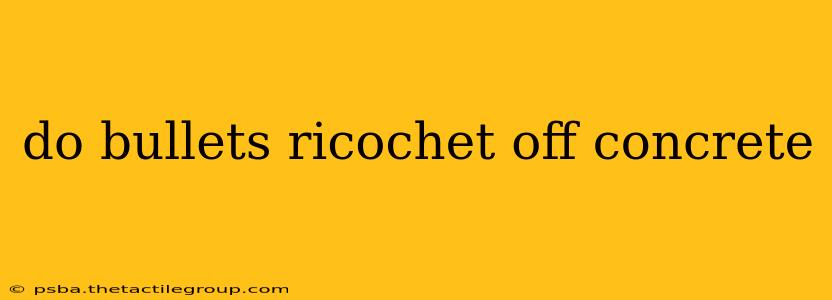The question of whether bullets ricochet off concrete is a complex one, not easily answered with a simple yes or no. The reality is that it depends on several crucial factors, making the behavior of a bullet upon impact far from predictable. This article will delve into the physics behind ricochets, exploring the variables that influence whether a bullet will bounce, shatter, or penetrate.
Factors Affecting Bullet Ricochet
Several factors determine whether a bullet will ricochet off concrete:
-
Angle of Impact: This is arguably the most important factor. A near-grazing angle (shallow angle) is far more likely to produce a ricochet than a perpendicular impact. The shallower the angle, the greater the chance of deflection.
-
Bullet Type and Velocity: The material, shape, and velocity of the bullet play a significant role. A heavier, slower round is more likely to embed itself in the concrete, while a lighter, faster projectile might ricochet, especially at a glancing angle. The bullet's structural integrity also matters; a bullet that fragments upon impact is less likely to ricochet.
-
Concrete Composition and Condition: The type of concrete, its age, and its condition significantly influence the outcome. Older, weathered concrete is more porous and likely to cause fragmentation or embedment rather than a clean ricochet. The presence of reinforcing bars (rebar) within the concrete can also affect the trajectory.
-
Surface Texture: A smooth concrete surface is more conducive to ricocheting than a rough, pitted surface. The roughness increases friction, leading to more energy loss upon impact, reducing the likelihood of a ricochet.
The Physics of Ricochet
When a bullet strikes a concrete surface, several forces are at play. The bullet's kinetic energy is transferred to the concrete, causing deformation in both the bullet and the concrete. If the angle of impact is shallow enough and the bullet retains sufficient energy after the initial impact, it can be deflected, resulting in a ricochet. However, a significant portion of the bullet's energy is typically lost as heat and sound during the impact.
Understanding Energy Transfer
The energy transfer during impact is crucial. If the concrete absorbs more energy than the bullet's remaining kinetic energy, the bullet will likely embed or fragment. If the concrete absorbs less energy, and the angle is shallow, the bullet might ricochet. This intricate energy exchange is extremely difficult to predict with complete accuracy.
The Dangers of Ricochets
Ricochets are inherently unpredictable and extremely dangerous. A ricocheting bullet can change direction dramatically, potentially striking unintended targets at unpredictable angles and distances. This unpredictability significantly increases the risk to bystanders and even the shooter themselves.
Conclusion: It's Complicated
While bullets can ricochet off concrete, it's not a guaranteed outcome. The numerous variables involved make accurate prediction nearly impossible. Treating any concrete surface as potentially capable of producing a ricochet is crucial for safety. Always practice responsible firearm handling and assume any bullet fired near concrete has the potential to ricochet. This understanding is essential for safe firearm handling and to prevent accidents.

